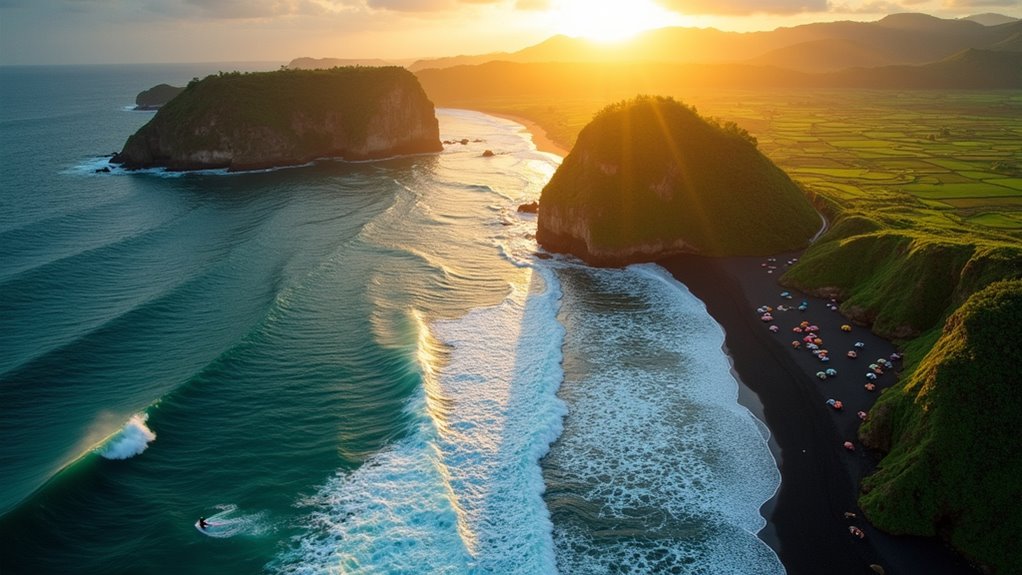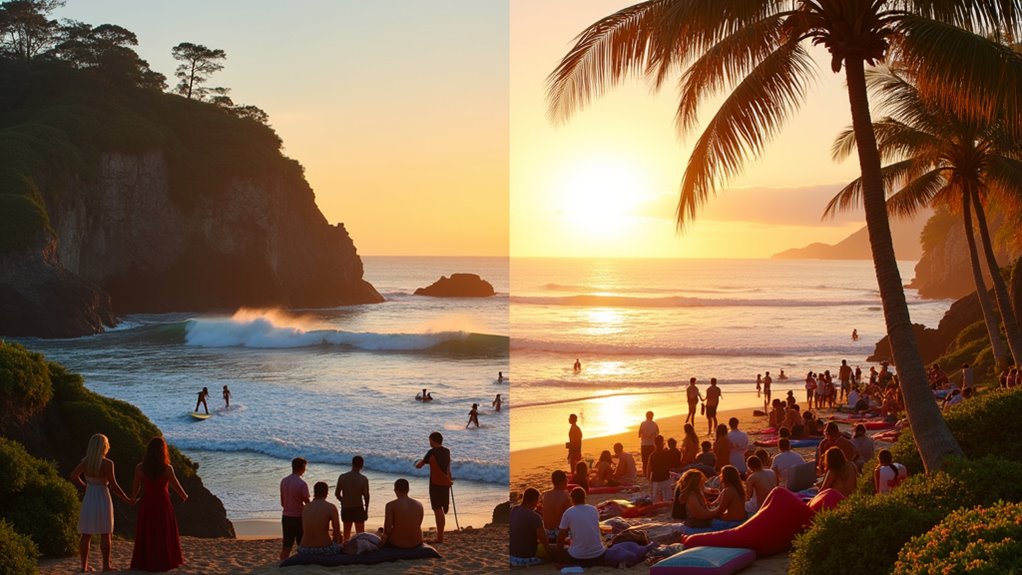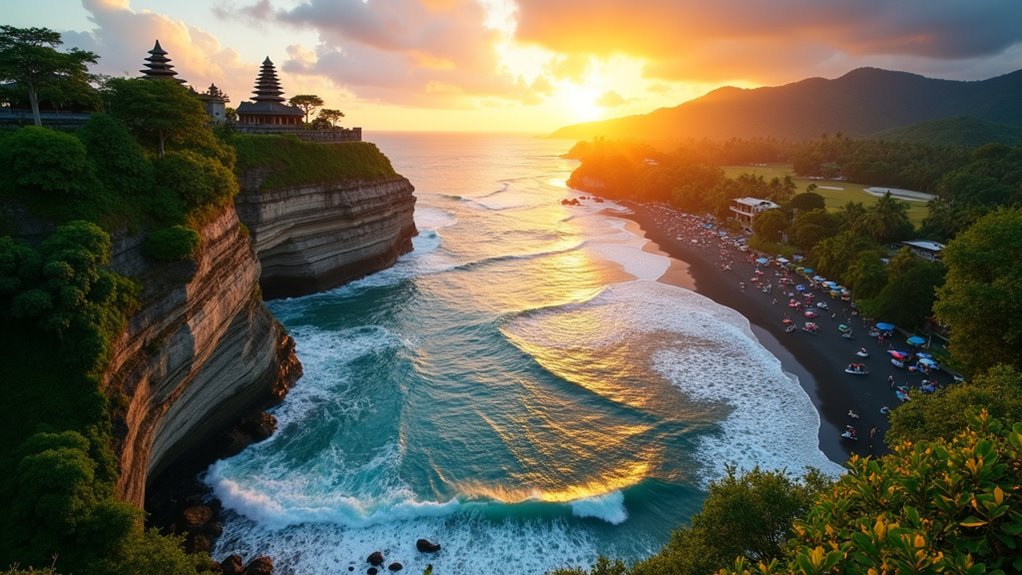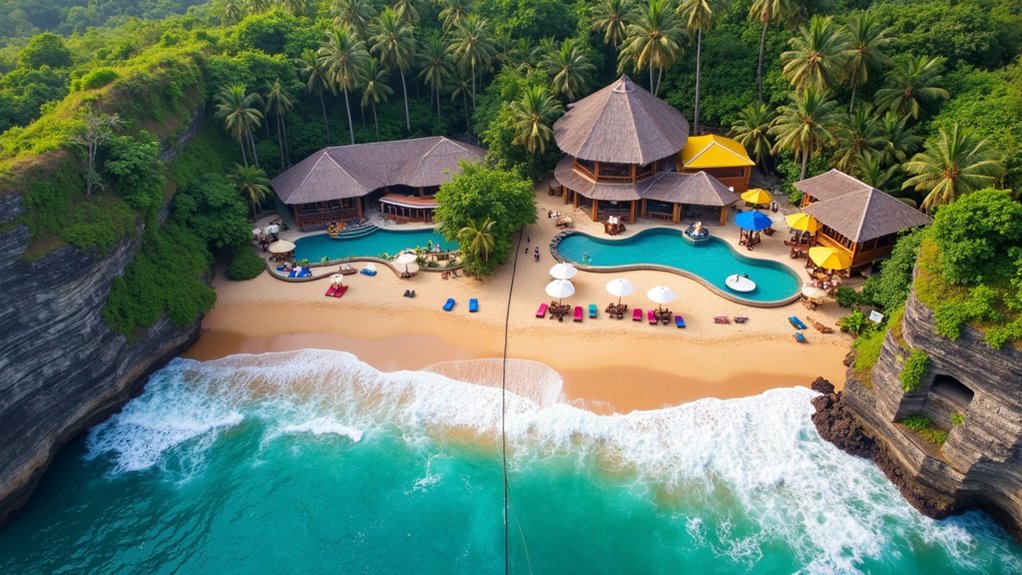Physical Address
304 North Cardinal St.
Dorchester Center, MA 02124
Physical Address
304 North Cardinal St.
Dorchester Center, MA 02124

Lost between Uluwatu's sacred cliffs and Canggu's surfer paradise? Discover which Bali gem matches your travel style perfectly.
Bali’s south coast presents two distinct personalities that many travelers overlook when planning their Indonesian getaway. You’re likely familiar with Kuta and Seminyak, but Uluwatu’s ancient clifftop temples and Canggu’s digital nomad enclaves offer completely different experiences on the same island. Whether you’ll thrive in Uluwatu’s serene spiritual atmosphere or Canggu’s hipster beach culture depends entirely on your travel priorities. The choice between these contrasting destinations can make or break your Balinese experience.

When exploring Bali’s most popular coastal areas, you’ll immediately notice the stark contrast between Uluwatu and Canggu‘s atmospheres.
Uluwatu embraces tranquility with its breathtaking cliff views, uncrowded beaches, and authentic Balinese cultural touchpoints. Many visitors are captivated by the rich surf culture and wildlife that permeates every aspect of daily life in the area. You’ll find a laid-back, exclusive environment where traditional performances like the Kecak dance at Uluwatu Temple showcase the area’s deep cultural roots.
Discover Uluwatu’s serene cliff-top magic where Bali’s authentic spirit breathes through uncrowded shores and ancient temple rituals.
Canggu, meanwhile, buzzes with cosmopolitan energy. It’s a vibrant hub for digital nomads with well-developed infrastructure, trendy cafés, and a lively international community. The area feels distinctly more developed and bustling, with co-working spaces and social events dominating the scene. For those seeking even more excitement, Jakarta offers thrilling adventures just a short flight away from Bali.
Your preference ultimately depends on whether you’re seeking peaceful luxury and culture (Uluwatu) or a dynamic, amenity-rich environment with a strong expat community (Canggu).
Though both regions boast stunning coastlines, Uluwatu and Canggu offer dramatically different beach and surf experiences that cater to distinct preferences and skill levels.
Uluwatu’s dramatic limestone cliffs create secluded coves with powerful reef breaks that attract professional surfers. Meanwhile, Canggu’s black sand beaches feature gentler waves perfect for beginners. Uluwatu is especially valued for its tranquil, scenic environment preferred by seasoned surfers seeking authentic experiences. Unlike these two locations, Sanur Beach offers a relaxed atmosphere with calm waters protected by a reef, making it ideal for families.
Key differences between these surf destinations:

Beyond the surf-ready shores, Uluwatu and Canggu offer distinct cultural and scenic experiences that showcase Bali’s diverse appeal.
Uluwatu excels in dramatic natural settings, with its clifftop temple providing panoramic ocean views and nightly Kecak Fire Dance performances. Visitors can enjoy the stunning spectacle of traditional Kecak and Fire Dance performances against the backdrop of Bali’s sunset, with tickets starting at just $14 per adult. Don’t miss the commanding 121-meter Vishnu statue at GWK Cultural Park or the secluded Nyang-Nyang Beach accessible via steep trails. When exploring these natural areas, remain vigilant as Indonesia is home to some deadly animals that inhabit various regions across the archipelago.
Canggu delivers more accessible attractions with a contemporary twist. You’ll find iconic Tanah Lot Temple nearby, vibrant street art throughout Batu Bolong, and Echo Beach’s black sands. The area caters to modern interests with beach clubs like Finns Recreation Club and The Lawn offering sunset cocktails.
Your preference depends on priorities: Uluwatu for majestic cultural landmarks and natural wonders, or Canggu for convenient, trend-forward experiences.
While both regions showcase Bali’s affluent legacy, Uluwatu and Canggu offer distinctly different culture opportunities. Uluwatu provides a more traditional experience centered around its iconic cliffside temple where you’ll witness the mesmerizing Kecak Fire Dance performed against breathtaking sunset backdrops. The spiritual significance of Pura Luhur Uluwatu as one of nine primary temples protecting Bali from evil spirits makes it an especially important cultural landmark.
For authentic cultural engagement in Uluwatu, consider:
The area’s deep Hindu roots are evident in regular ceremonies and rituals, while Canggu presents a more modernized cultural scene blending traditional elements with contemporary influences. Visitors planning extended culture should consider the visa-free stay options that allow up to 30 days to fully experience these unique regional differences.

Traveling between Uluwatu and Canggu requires some planning, as these two popular Balinese destinations sit approximately 34 kilometers apart. The journey takes about 33 minutes by car without traffic, making driving the fastest and most economical land option at Rp60,000-95,000.
You’ll find multiple transportation choices to suit your preferences. Renting a car offers flexibility but requires a valid license and understanding of local driving rules. Many travelers opt for scooter rentals which provide flexible exploration options at only $4-7 per day.
For convenience without parking hassles, hiring a private driver (Rp800,000-1,200,000 daily) is ideal for sightseeing. Taxis like Grab provide another alternative, though typically at higher rates.
Consider ferry services for a scenic route, though they’re more expensive (Rp320,000-340,000) than land options. While traveling between these destinations, you can add some adventure activities to make your journey more exciting.
Remember that Bali’s traffic can considerably extend travel times, especially during peak hours, so plan accordingly.
When comparing the food scenes of Uluwatu and Canggu, you’ll discover two distinct culinary landscapes despite their relatively close proximity. Canggu boasts over 50 eateries dominated by casual cafés and budget-friendly warungs, while Uluwatu balances its similar number of restaurants with more upscale cliff clubs and seafood grills.
Your budget stretches further in Canggu, where you’ll find:
The dollar goes the distance in Canggu, offering everything from $1 local meals to trendy international bites without breaking the bank.
Canggu has become known for its health-conscious eateries like The Shady Shack, which serves delicious vegetarian and vegan dishes in a relaxed garden setting. Both areas feature excellent burger joints that have become increasingly popular among travelers seeking familiar comfort food with a Balinese twist.
Uluwatu offers fewer budget options but excels in atmosphere with cliffside dining at places like Bartolo and El Kabron, where European cuisine meets breathtaking ocean views and romantic sunset seafood BBQs.

For budget-conscious travelers, the cost comparison between Uluwatu and Canggu reveals striking differences that could considerably impact your Bali experience. Uluwatu consistently offers more affordable accommodation options, with lower villa rental costs compared to Canggu’s trendy but pricier alternatives.
Budget travelers can expect daily expenses between $35-$95 in both locations, totaling $245-$665 for a week-long stay.
While activity costs remain similar across both areas (temple visits cost $2-$5), Uluwatu’s overall lower cost of living makes it the more economical choice.
Canggu caters better to luxury travelers with its developed tourist infrastructure and proximity to major amenities.
Meanwhile, Uluwatu’s growing property market and increasing social media popularity signal promising investment potential with expectations for greater returns compared to Canggu’s stable market. Long-term visitors could significantly reduce their accommodation expenses through rental negotiations, especially when committing to leases of several months or more.
Both areas offer opportunities to enjoy Bali’s renowned tattoo studios which have become popular tourist attractions for visitors seeking permanent memories of their island experience.
Choosing between Uluwatu and Canggu depends largely on your travel style, interests, and what you hope to experience during your Bali adventure.
Uluwatu attracts those seeking spiritual connections, advanced surfing, dramatic landscapes, and culture. You’ll find cliff-top temples, legendary surf breaks, and traditional Kecak performances against stunning ocean backdrops. It’s perfect for photographers, experienced surfers, and those wanting a more authentic Balinese experience. Both destinations offer unique Bali vacation experiences depending on whether you prefer serene cliff views or trendy beachside vibes.
Canggu calls to:
Choose Uluwatu for natural beauty and tradition; choose Canggu for convenience and contemporary Bali living. Visitors to Uluwatu can explore numerous stunning viewpoints and pristine beaches such as the expansive Nyang-Nyang Beach, which stretches 1.5 km along limestone cliffs and offers seclusion due to its difficult access.
Whether you choose Uluwatu’s serene cliffs or Canggu’s buzzing streets, you’ll discover Bali’s unique magic in different forms. As they say, “one person’s paradise is another’s ordinary day.” Consider your priorities—peace and tradition or social energy and modern comforts—when making your decision. Both destinations offer authentic experiences, just through different lenses. Trust your instincts and the destination that resonates with your travel style won’t disappoint.